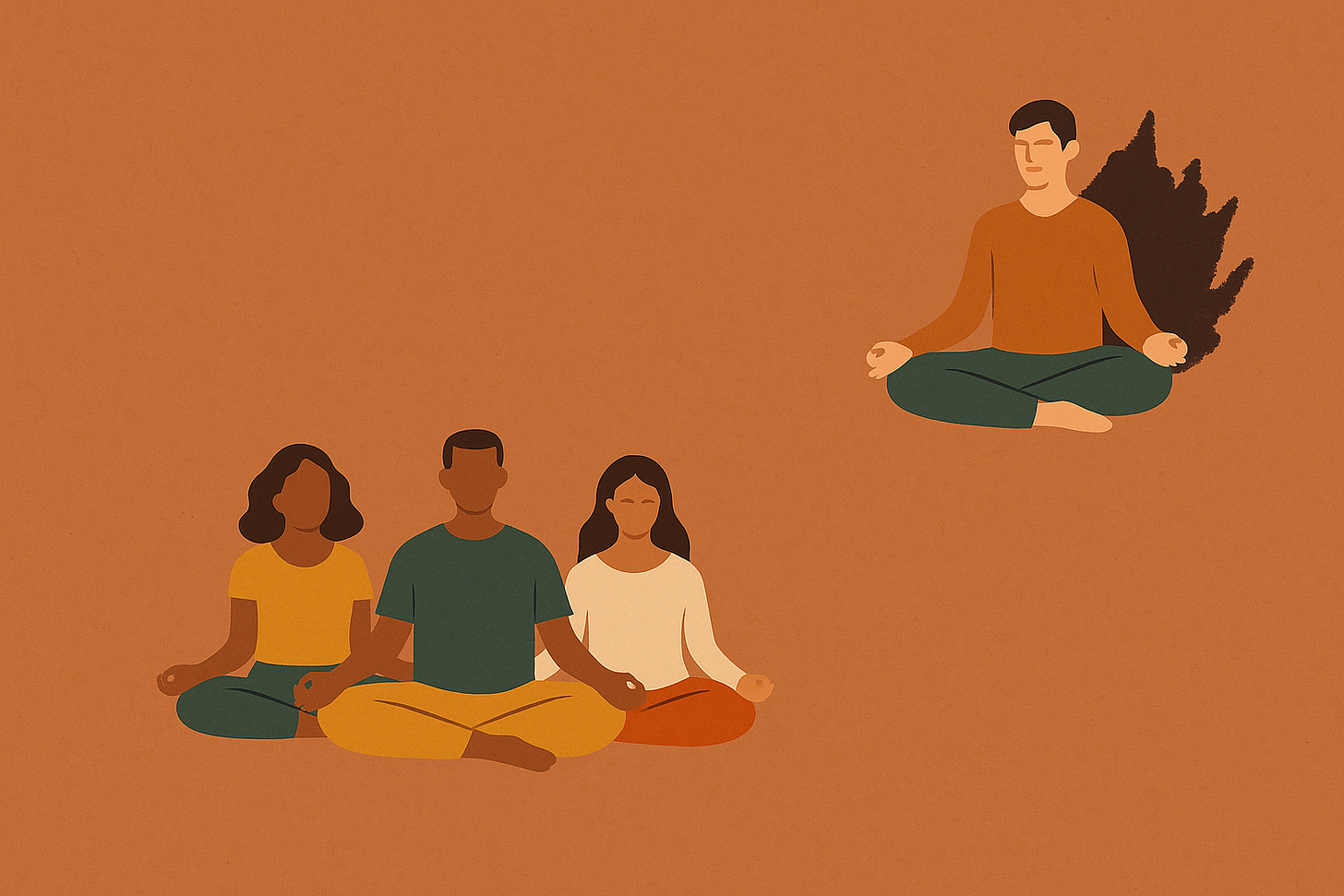Is Your Meditation Practice Fueling Toxic Independency?
When the Spiritual Path Becomes Just Another Way to Avoid Connection
Meditation is often seen as a solo-act. We reach our own, personal insights and are better because of it. Finding your awakening is the supreme act of self-mastery.
This idea is attractive to many spiritual seekers who set out on their journeys. The Bali and Rishikesh circuits are teeming with solo travelers on this quest, this hero’s journey. I know because I was one of them!
But this mindset comes with at least three big blind spots:
We fall into the trap of toxic independency—believing we should do it alone.
We bypass our emotions and skip the deeper work.
We miss out on the richness of connection, co-creation, and shared healing.
The Myth of Going It Alone
Most of us meditate alone, earbuds in, app on, checking off our inner work like a to-do list. Society makes it easy. Plug in, tune out.
But traditionally, meditation was practiced in community. Even Himalayan sadhus who renounce everything often travel and sit together.
And there are certain experiences—like neurosynchrony (synchronized brain and heart activity between individuals)—that only happen with others.
I've guided meditation groups for three years. People often say it's easier than doing it alone. There’s something biological about being in rhythm, breathing together, hearts quietly syncing. Solidarity deepens the silence.
Without community, we can blindside ourselves, repeating the same emotional patterns without knowing it. When the heart-mind feels connected, we more easily drop into the very states we’re striving for!
Many spiritual seekers want to "figure it out" for their own awakening. But focusing solely on yourself is a form of delusion. It reinforces the illusion of separation—the very thing practice is meant to dissolve. Our wellbeing is never in isolation. It’s woven into everything and everyone.
Spiritual Bypassing
I wrote an article recently about meditating without bypassing that seemed to strike a chord. Many people get stuck in this pattern of avoiding their real problems. Again, I speak from my own experience.
This toxic independence is partly due to society’s emphasis on rugged individualism – a belief that we can do it on our own. It can be exacerbated by a certain psychological pattern called avoidant or dismissing attachment. Psychologist Daniel Brown summarizes a few of these tendencies:
Avoidance of being intimate
Preference for remaining distant
Discomfort with opening up
Illusion of self-sufficiency
Alexithymia (struggle recognizing feelings)
It's no wonder solo meditation is so appealing. But while you can get insights alone, you can’t fully heal that way. Because our deepest wounds are relational, our deepest healing needs to be, too.
Those hurts from childhood are lodged in the nervous system and play out as chronic overwork, insecurity, or emotional distancing. These aren’t your personality or ‘who you are’—they’re patterns.
It’s only in the presence of a loving witness or community can we begin to unravel the patterns to feel truly held and whole again.
What Are We Really Practicing?
Modern mindfulness has been stripped of its context. We chase outcomes: more calm, more focus, more freedom. That turns meditation into just another tool for personal productivity—which fits all too neatly into capitalism and individualism.
But in the Eightfold Path, meditation is just one of eight limbs. Living in a way that doesn’t harm others and being kind and truthful in speech were just as important. In Christianity, community and service are paramount. In Sufism, service to others is the embodiment of devotion.
The podcast episode Mindfulness is Not Enough dives into this topic beautifully:
“Mind needs fire and water, breath and movement, it needs story and song... it needs to establish a living relationship with those that came before and those yet to come, to offer in devotion and to repeatedly enact its place in the larger cosmos.”
Even more ‘serious’ meditators and yogis that cultivate deep states of samadhi fall into this trap and forget what it’s really about. Jack Kornfield reminds us that after your insights and experiences, you still need to do the laundry – and find a way to ‘bring it back home.’ Rob Burbea’s Soulmaking Dharma is a creative, fun and alive version of playing with meditation that isn’t dry and isolated.
What I’m wrestling with: I’m in a phase of integration. I lead retreats blending ancient and modern. I also offer corporate mindfulness sessions that are short, sharp, and focused on productivity. It sometimes feels like a contradiction. But I’m trying to create something fresh—sneaking in new perspectives in places where humanity tends to be forgotten (like in the workplace). I’m still evolving.
New Lenses, New Lives
The lens through which we view life shapes how we live it. The belief that we have to go it alone only creates more separation and suffering.
Connection brings aliveness, belonging, and love. And learning how to be together might just be the most spiritual thing of all.
Reflection Questions
Am I meditating to avoid or to connect?
Who or what am I doing this for?
What would it mean to practice for the benefit of others?
What if awakening wasn’t about mastery, but about deepening love and connection?
What kind of spiritual community would actually nourish me?




